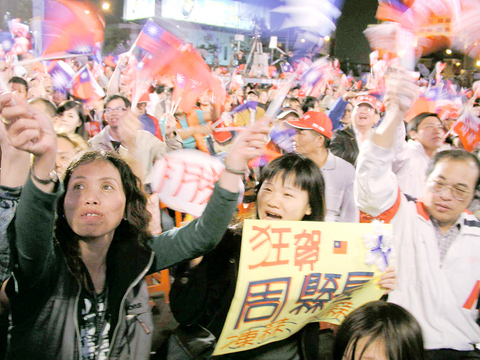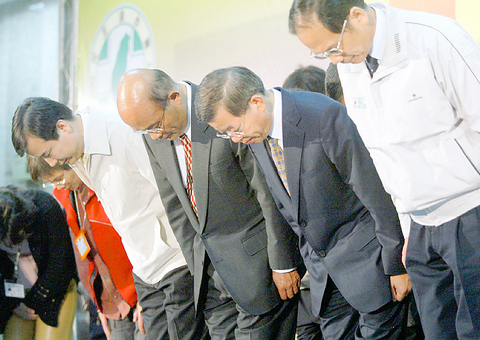The Chinese Nationalist Party (KMT) won a resounding victory over the Democratic Progressive Party (DPP) in yesterday's local government elections, in a win attributed to voter unhappiness with the DPP's poor performance and entanglement in recent scandals.
The KMT won 14 out of 23 city and county constituencies, while the DPP -- which previously controlled 9 counties and cities -- won just six seats.
Among the constituencies that changed hands from the DPP to the KMT were the traditional pan-green strongholds of Taipei and Ilan Counties. The DPP also lost Chiayi City, long an anti-KMT sanctuary during the days of Martial Law and the dangwai democracy movement.

PHOTO: LIN CHIN-CHI, TAIPEI TIMES
"This is not a triumph for the KMT but for the Taiwanese people," KMT Chairman Ma Ying-jeou (馬英九) said in a victory speech last night. "The DPP was not defeated by the KMT, but by itself."
Ma had said that he would resign if his party failed to get at least 11 candidates elected in the commissioner and mayoral polls.
Yesterday's vote was called a "three-in-one" election because it combined county commissioner and city mayor elections, county and city councilor elections and township chief elections.

PHOTO: LIN CHENG-KUN, TAIPEI TIMES
Although yesterday's elections were local government polls, the ruling and opposition parties considered the results crucial to gaining momentum ahead of the 2008 presidential election, raising the stakes in the contest.
In two key races, the Democratic Progressive Party's (DPP) Luo Wen-chia (
Relentless attacks
Although the KMT has often been criticized for its poor campaign strategy, analysts attributed the party's success to its relentless criticism of the government's poor record and tenacious pursuit of a recent string of scandals, including the Kaohsiung Rapid Transit Corp (KRTC) scandal and the "vultures" insider-trading case.
DPP Chairman Su Tseng-chang (蘇貞昌), who said that he would resign as chairman if Luo lost in Taipei County, or if the party failed to win at least 10 seats in the commissioner and mayoral polls, offered to resign last night.
Su said that his party accepted the election results, and he called on the public to continue to have faith in the DPP.
"The DPP has lost one election, but Taiwan cannot lose," Su said.
To express their regret over the defeat and accept responsibility for the outcome, Su, Presidential Office Secretary-General Yu Shyi-kun and Premier Frank Hsieh (謝長廷) bowed to the public three times.
66 percent turnout
The DPP garnered about 3.7 million votes -- around 42 percent of the total, while the KMT received 4.5 million votes, or about 51 percent. The Central Election Commission estimated the turnout to be approximately 66 percent of registered voters.
The DPP held on to its southern strongholds of Pingtung County, Tainan City and county and Kaohsiung County, while the KMT took control in northern, central and eastern Taiwan.
Three remote counties on outlying islands remained loyal to the pan-blue camp, with Penghu, Kinmen County and Lienchiang County -- the official administrative title for the Matsu archipelago -- all firmly controlled by the pan-blue alliance. Kinmen County went to the New Party, while Lienchiang County went to the PFP and Penghu went to the KMT.
The People First Party (PFP) captured one district, while the Taiwan Solidarity Union (TSU) came out of yesterday's vote empty-handed.
Blue north
In northern Taiwan, the KMT seized control in six districts, including Taipei, Taoyuan, Hsinchu and Miaoli counties as well as Hsinchu and Keelung Cities. The DPP captured none.
In central Taiwan, the KMT obtained six seats in Taichung, Changhua and Nantou counties and Taichung and Chiayi cities. The DPP captured Yunlin County and held on to Chiayi County.
Eastern Taiwan, which has long been controlled by the KMT, remained a pan-blue stronghold.
Hualien County went to the KMT, while a scandal-plagued former KMT member also won in Taitung County as an independent candidate.
Taitung Council Speaker Wu Chun-li (吳俊立) defeated two independent candidates to hold on to his seat. Wu, however, may be suspended from his post in accordance with the Law on Local Government Systems (地方制度法).
He was convicted of corruption by the High Court but has appealed the ruling. He has also been charged with vote-buying but is out on NT$1 million (US$29,800) bail.

US PUBLICATION: The results indicated a change in attitude after a 2023 survey showed 55 percent supported full-scale war to achieve unification, the report said More than half of Chinese were against the use of force to unify with Taiwan under any circumstances, a survey conducted by the Atlanta, Georgia-based Carter Center and Emory University found. The survey results, which were released on Wednesday in a report titled “Sovereignty, Security, & US-China Relations: Chinese Public Opinion,” showed that 55.1 percent of respondents agreed or somewhat agreed that “the Taiwan problem should not be resolved using force under any circumstances,” while 24.5 percent “strongly” or “somewhat” disagreed with the statement. The results indicated a change in attitude after a survey published in “Assessing Public Support for (Non)Peaceful Unification

The CIA has a message for Chinese government officials worried about their place in Chinese President Xi Jinping’s (習近平) government: Come work with us. The agency released two Mandarin-language videos on social media on Thursday inviting disgruntled officials to contact the CIA. The recruitment videos posted on YouTube and X racked up more than 5 million views combined in their first day. The outreach comes as CIA Director John Ratcliffe has vowed to boost the agency’s use of intelligence from human sources and its focus on China, which has recently targeted US officials with its own espionage operations. The videos are “aimed at

‘MISGUIDED EDICT’: Two US representatives warned that Somalia’s passport move could result in severe retaliatory consequences and urged it to reverse its decision Minister of Foreign Affairs Lin Chia-lung (林佳龍) has ordered that a special project be launched to counter China’s “legal warfare” distorting UN Resolution 2758, a foreign affairs official said yesterday. Somalia’s Civil Aviation Authority on Wednesday cited UN Resolution 2758 and Mogadishu’s compliance with the “one China” principle as it banned people from entering or transiting in the African nation using Taiwanese passports or other Taiwanese travel documents. The International Air Transport Association’s system shows that Taiwanese passport holders cannot enter Somalia or transit there. The Ministry of Foreign Affairs (MOFA) protested the move and warned Taiwanese against traveling to Somalia or Somaliland

Four former Hong Kong opposition lawmakers jailed in the territory’s largest national security case were released yesterday after more than four years in prison, the first among dozens convicted last year to regain their freedom. Former legislators Claudia Mo (毛孟靜), Jeremy Tam (譚文豪), Kwok Ka-ki (郭家麒) and Gary Fan (范國威) were part of a group of 47 public figures — including some of Hong Kong’s best-known democracy advocates — who were charged with subversion in 2021 for holding an informal primary election. The case fell under a National Security Law imposed on the territory by Beijng, and drew international condemnation and warnings